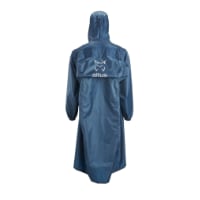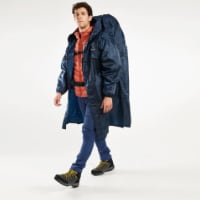- Time of past OR future Camino
- 2024 Le Puy - Cahors + Saint-Jean - León
Anyone who has walked the Camino will immediately identify and sympathise with Richard Frazer as he tells the story of his journey from Le Puy to Santiago.
"I hobbled into La Ferme du Barry (…) a defeated man. Only three days into my pilgrimage from Le Puy-en-Velay to Santiago de Compostela, I was broken and utterly dejected. My knees were shot by the constant up and down of the hilly terrain, I had the worst dose of tendonitis I had ever known in my left ankle, and blisters covered the soles of both my feet. I felt totally crippled and doubted I could go on. I had arrived from Edinburgh only days before, and now felt I needed to get back on the train and head home with my tail between my legs, a humiliated man who’d completely misjudged his ability. I was rehearsing in my mind what I might say to all the people who’d supported me in this venture, how I’d tell them that it was all a big mistake and beyond me. I was also missing my family and ached for them in my misery."
While this is a book most people will enjoy, it will attract in particular people interested in the spiritual dimension to the Camino. Scots and Presbyterians (I am neither) will find it especially amusing to follow this Scottish Calvinist as he is confronted with very liturgical Catholic services in ornate baroque churches, fraternises with monks and ends up having to spend two days in a convent or "nunnery" as he calls it, tongue in cheek.
Richard senses a quest for spirituality in the majority of people on the Camino and is harsh in his condemnation of the obstacles that institutionalised religion, Catholic and Protestant, puts in the path of such people.
Readers of R. L. Stevenson’s classic "Travels with a donkey in the Cévennes", will recognise that the title of Richard's book is a nod and hommage to his fellow countryman.
Richard is a Presbyterian minister in Edinburgh. He founded and chairs the Grassmarket Community Project, which helps vulnerable people. He has also been influential in the revival of pilgrimage in Scotland.
Here are two other extracts from the book which will give you a feeling for the content and tone of the book:
"I had also brought my leather ‘cowboy hat’, goodness only knows why. By the time I made it to the cathedral (…) my hat was completely saturated and stayed wet for the best part of the next four days. I grew to resent and then to hate that hat, as not only was it now a ton weight; it was also unbelievably uncomfortable. It was eventually dispatched home in a box along with a number of other articles that proved surplus to requirements."
and
"Pilgrimage fits the bill for Millennials, for Generation X, or whatever term we wish to use to describe the present young generation, for many of whom the church is just an embarrassment or a haven for pat and frequently trite answers to life’s difficult questions. To be a pilgrim you don’t have to jump through hoops or sign up to doctrines you’d rather question — you just have to set off! Indeed, that is what the first ever pilgrim, Abraham, did. Ripe in years, he just upped and left Haran with his equally ancient wife, Sarah, and the rest is history, as it were.
As we walked on, I was reminded of how fruitful it is to walk side by side and converse over an extended period. It’s the kind of thing we often don’t allow ourselves enough time for in our fast-moving society. Those who headed off on pilgrimage in the Middle Ages might have been engaging in some pious or penitential journey. They might even have paid someone to do it for them. (As my friend Martin Palmer pointed out to me, his name, Palmer, means someone who undertakes a pilgrimage on behalf of another.) But for those who hit the road, they’d have found that the destination is really the journey itself, and it is the time spent in conversation and encounter along the way where the Spirit is really at work, rather than in the place of dry bones at the end of the pilgrimage."
"I hobbled into La Ferme du Barry (…) a defeated man. Only three days into my pilgrimage from Le Puy-en-Velay to Santiago de Compostela, I was broken and utterly dejected. My knees were shot by the constant up and down of the hilly terrain, I had the worst dose of tendonitis I had ever known in my left ankle, and blisters covered the soles of both my feet. I felt totally crippled and doubted I could go on. I had arrived from Edinburgh only days before, and now felt I needed to get back on the train and head home with my tail between my legs, a humiliated man who’d completely misjudged his ability. I was rehearsing in my mind what I might say to all the people who’d supported me in this venture, how I’d tell them that it was all a big mistake and beyond me. I was also missing my family and ached for them in my misery."
While this is a book most people will enjoy, it will attract in particular people interested in the spiritual dimension to the Camino. Scots and Presbyterians (I am neither) will find it especially amusing to follow this Scottish Calvinist as he is confronted with very liturgical Catholic services in ornate baroque churches, fraternises with monks and ends up having to spend two days in a convent or "nunnery" as he calls it, tongue in cheek.
Richard senses a quest for spirituality in the majority of people on the Camino and is harsh in his condemnation of the obstacles that institutionalised religion, Catholic and Protestant, puts in the path of such people.
Readers of R. L. Stevenson’s classic "Travels with a donkey in the Cévennes", will recognise that the title of Richard's book is a nod and hommage to his fellow countryman.
Richard is a Presbyterian minister in Edinburgh. He founded and chairs the Grassmarket Community Project, which helps vulnerable people. He has also been influential in the revival of pilgrimage in Scotland.
Here are two other extracts from the book which will give you a feeling for the content and tone of the book:
"I had also brought my leather ‘cowboy hat’, goodness only knows why. By the time I made it to the cathedral (…) my hat was completely saturated and stayed wet for the best part of the next four days. I grew to resent and then to hate that hat, as not only was it now a ton weight; it was also unbelievably uncomfortable. It was eventually dispatched home in a box along with a number of other articles that proved surplus to requirements."
and
"Pilgrimage fits the bill for Millennials, for Generation X, or whatever term we wish to use to describe the present young generation, for many of whom the church is just an embarrassment or a haven for pat and frequently trite answers to life’s difficult questions. To be a pilgrim you don’t have to jump through hoops or sign up to doctrines you’d rather question — you just have to set off! Indeed, that is what the first ever pilgrim, Abraham, did. Ripe in years, he just upped and left Haran with his equally ancient wife, Sarah, and the rest is history, as it were.
As we walked on, I was reminded of how fruitful it is to walk side by side and converse over an extended period. It’s the kind of thing we often don’t allow ourselves enough time for in our fast-moving society. Those who headed off on pilgrimage in the Middle Ages might have been engaging in some pious or penitential journey. They might even have paid someone to do it for them. (As my friend Martin Palmer pointed out to me, his name, Palmer, means someone who undertakes a pilgrimage on behalf of another.) But for those who hit the road, they’d have found that the destination is really the journey itself, and it is the time spent in conversation and encounter along the way where the Spirit is really at work, rather than in the place of dry bones at the end of the pilgrimage."
Travels With a Stick: A Pilgrim's Journey to Santiago de Compostela: Amazon.co.uk: Richard Frazer: 9781780275680: Books
Buy Travels With a Stick: A Pilgrim's Journey to Santiago de Compostela by Richard Frazer (ISBN: 9781780275680) from Amazon's Book Store. Everyday low prices and free delivery on eligible orders.
www.amazon.co.uk



